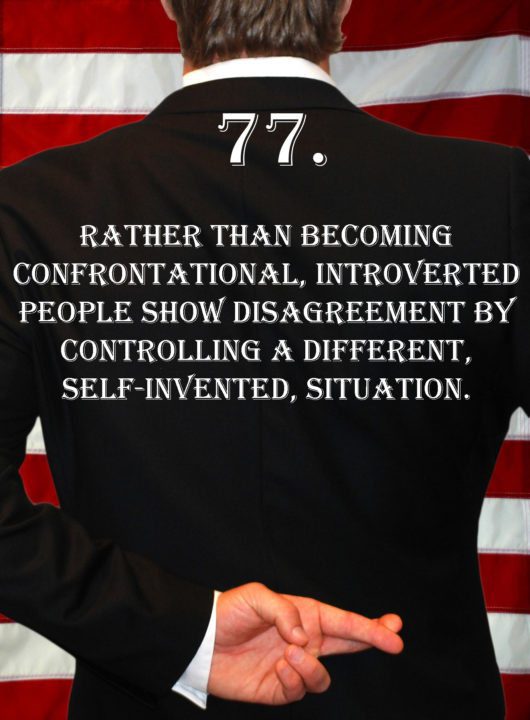
Deception Tip 77:
Rather than becoming confrontational, introverted people show disagreement by controlling a different, self-invented, situation.
Listen To The Podcast!
E77 – Introverted People – Deception Tips Podcast – Click Here To Subscribe
Podcast Transcript
Hello and welcome to the Deception Tips podcast where you will learn amazing cues to detect deceit that will help you read people like never before. I’m your host Spencer Coffman, let’s get started.
Hello and welcome to Deception Tip episode number 77, you’ve been listening for a long time, thank you for that. We’ve got a great episode in store for you today, something we have never talked about before.
Hard to believe it but in 77 episodes, we haven’t talked about this topic, so you’re in for a real treat. That doesn’t mean you don’t need to listen to the past episodes because those episodes will build on your knowledge in this and in detecting deception in general.
Therefore, before we dive into today, let’s recap last week’s episode of Covering the Mouth, which was episode number 76. You can also check out the video that goes along with that. If you’re a reader, take a look at the Deception Tips Revised and Expanded Edition tip number 76, so you can get a little bit more information on it.
We talked about how liars will unconsciously cover their mouths before they’re telling a lie, or maybe even after they told the lie. They are unconsciously trying to prevent that lie from getting out. Remember there is a huge battle going on between the conscious mind and the unconscious mind. Also, remember I talked about these like they are two separate minds but it’s the same brain.
It’s exactly like you can have a different mindset, if you look at it through this mindset, it may make sense, but if you look at it with this mindset, you may not understand it. So, these are two different mindsets, there’s the conscious and the unconscious, it’s mentalities, it’s states of mind that are going on in the background of your brain.
The conscious wants to get away with that lie, remember it is pushing to cover up anything, to get away with whatever it can, to avoid pain, maximize pleasure, that’s your conscious. The unconscious is trying so hard to put the truth in front of everybody, it wants the truth to be known, and it wants the truth to be out.
The unconscious is by definition unconscious, it’s active but it’s not on the front, it’s not conscious, it’s not being pushed forward right away. It is working behind the scenes subtly, passive-aggressively, in the shadows, to leak certain signs of truthful behaviors.
These are all the deception tips that you are paying attention to and learning, these are the unconscious things, whether it’s verbal communication, whether it is body language, nonverbal, etc. These are unconscious body language deception tips that you are learning to read that are coming out and Covering the Mouth is one of them.
If you remember, we’ve talked about this once before, other than last week, way back in episode number 45 when we discuss Hushing the Lips. How liars may shush themselves with their fingers. Remember how it looks, they may have one or both fingers over their lips with their thumbs under their chin.
It could also take the form of the thinking man’s posture, where they may have a couple of fingers, it could be the index finger and the middle finger of one hand right over their lips, it could be index fingers from both hands, etc.
The covering of the mouth is going to be like a clasped hand, like in the movies where you see somebody is about to speak and someone reaches around and grabs them or when someone is kidnapping someone, they cover their mouth right away.
It’s that clasping of the mouth and you’ll see that when a liar isn’t really sure about what they want to say. They’re trying to hold back or prevent themselves from telling that lie unconsciously, of course. Hopefully, you have a pretty good idea of what it looks like, you’ve no doubt seen it. Hopefully, my little visuals or descriptions have helped you with that.
Moving on to today’s episode, we’ve got, as I said, a very special episode today because we are talking about a personality type in general. That’s right, we’re going to talk about introverted people and how they respond differently to confrontation.
Therefore, when you’re using a lot of these tactics, if it’s an introverted person, you may get some different responses or some things that do not quite fit the mold that we’ve been talking about throughout all of these deception tips.
In these deception tips, we’ve been talking about quote-unquote, normal people. Introverted people are normal and extroverted people are normal but now we’re talking about the ends of the spectrum, the outliers, the highly introverted.
So, here it is, Deception Tip number 77. Rather than becoming confrontational, introverted people show disagreement by controlling a different self-invented situation. Here it is again, Deception Tip number 77. Rather than becoming confrontational, introverted people show disagreement by controlling a different self-invented situation. So, this is very interesting in that when an introverted person is confronted, they don’t like that.
Therefore, if they want to have some control, they may invent something in that situation to exert their control to help them feel more comfortable in that environment and in that situation. We talked a little bit about that before, but before we get into that though, I really want to cover one thing because it might put some of you on edge, the fact that I said normal.
There are introverted people, there are extroverted people, everybody is pretty much introverted or extroverted, they have tendencies one way or the other that is normal, that’s very normal.
Now, there are other people and they’re normal too, I’m saying normal based on the majority of people. If you say alright, we’re going to total up everybody in the world, the majority, 80 percent of the population has blue eyes, this is false by the way.
If you say that 80 percent of the population has blue eyes, it’s been tallied up then it would be normal to have blue eyes based on the situation and environment of everybody around them.
So, when I say normal, I’m not saying wrong, I’m saying it is normal in that most people are introverted or extroverted, they have tendencies. Therefore, when you get someone who is very, very introverted, that’s what I’m referring to here.
On the opposite side, if they’re very, very extroverted, but that’s something we’re not going to talk about. Usually, very, very extroverted people, you can handle them the same way as with all of these other tips that we’ve been talking about but very, very introverted people are not going to handle the confrontation the same as everybody else.
With that established, we’re going to talk more about how they will show this disagreement because they don’t want the confrontation, they don’t like that. They’re going to be a little bit passive-aggressive with their disagreement and how they do that is different than other people and how they exert that disagreement. So, we’re going to talk a lot more about it coming up right after this.
Not only can you listen to these deception tips, but you can also watch a quick video explaining each one. Subscribe to the Body Language YouTube channel today.
Welcome back to Deception Tip episode number 77 where we are talking about highly introverted people and how they will show disagreement compared to other people because it’s going to be different. Introverted people do not like that confrontation. The confrontation that we’re talking about when it comes to detecting deception and reading people, is being questioned or being challenged.
It’s not being questioned as in ‘where were you on this day or what is this or tell me more about this that happened or tell me your story’.
It is the confrontational questioning, the direct questioning where you are saying that you’re not believing part of their story and you’re challenging that story, looking for more information on it. You’re doubtful, you’re doubting what they’re saying and you’re posing that as questions to further get to the truth and establish it.
They don’t like that type of confrontation, so to combat that, they’re going to do things to help them be put more at ease with the situation around them and their environment.
What are some of the things that they may do? Well, we have talked about this a little bit, how people will bring elements of home or elements from other locations where they were comfortable to a new environment in an effort to become more comfortable.
We’ve talked about Comfort Gestures or Comforting Gestures, things like folding the arms way back in episode 1, Locking Ankles, Crossing Legs, and people giving themselves a hug as a comfort gesture. This is more like; if at home, when you’re working in your room, you’re always tapping your fingers on the knuckle of your other hand.
Well, when you’re in that stressful situation, that unfamiliar environment, you may tap your fingers on the knuckle of your other hand unconsciously to bring that element of home to that location, to help you feel a little bit more at home. That is the thing we’re talking about only it may be done on a bigger level. So, they’re going to start doing things as a part of their normal routine in their familiar environment.
They’ll bring them into the new environment and that will help them become a little bit more familiar with that situation and be a little bit more at ease there, that’s the first step. Then when you start showing more conflict, more disagreement, more confronting and questioning, challenging them, they might show this disagreement.
Rather than like an extroverted person who would show this type of confrontation by directly battling you back or by getting mad, having an outburst, challenging you, saying ‘how dare you’, they may be pushing it back on the target. An introverted person may exert control of the situation, they may even invent some type of a situation that they can control.
They might create their own problem and then solve it to give them that feeling of security and satisfaction like the illusion of control. In addition, they may also exert control over the target. Simple things such as having the target get them a glass of water or saying ‘I’m hungry, get me something to eat’ and they’ll do these things to show their power over the target.
It’s not really showing their power over them because the target knows, everybody else knows who’s in control of the situation. This is simply giving the extremely introverted person something that they feel like they have a say in it, so they are making a request, it is being granted, now they are believing that they are controlling the situation. They feel a little bit more in control like they have a say.
It allows them to have some input into what’s going on in their environment, which will then make them a little bit more at peace and it will also help them to feel a bit more relaxed. When they start to feel a little bit more at peace and relaxed and comfortable with this situation than as an introverted person, they will start to open up.
If they are definitely stressed, not relaxed and everything is wrong, they aren’t going to talk at all, introverted people will not open up if they are not comfortable and they feel like they’re cared about or they feel in control. So, as soon as they start feeling that they’re going to start talking more, it is in your benefit if this is an introverted person, an extremely introverted person, to go along with some of their stuff.
Obviously not everything, you’re not going to bend over backward for them because you’re the one asking the questions. They’re the one who is questionably in trouble, so you’re calling the shots, which means that you’re going to do what you can to make them feel comfortable, to help them be able to answer your questions, but you’re not going to bend over backward for them. You can if you want but it might not be that great of an idea.
Whereas an extroverted person, they don’t need that. If they’re stressed, it might be good to put on a little bit more stress because now they’re going to be uncomfortable, which may get them to talk so they feel more comfortable because they’re extroverted. Extroverted people like the spotlight, they want to talk, they want to be seen, and they want that recognition.
Highly extroverted people are borderline narcissistic, some of them aren’t but they want that so they’re going to talk to help themselves feel more comfortable. Whereas the introvert, they won’t talk at all because talking already makes them uncomfortable. So, if they’re uncomfortable and they don’t like to talk to people because they’re introverted, why would they talk more?
That would make them even more uncomfortable, so the first step is to make them comfortable with the environment and the situation, then they may feel like loosening up and talking to open up and come out of their shell a little bit and hopefully give you the answers you need.
I want to thank you for listening to this week’s episode of the Deception Tips podcast. I hope you’ll share it with your friends, subscribe to the feed, check out the Deception Tips videos, the blog, and take a look at the books I have available and as always, tune in next week for a new deception tip.
Video Transcript
Hey guys, my name is Spencer Coffman, thank you for watching the Deception Tips videos. They’re all about teaching you how to read people and detect deception so that you will be able to tell if someone is lying to you. Today, we are going to talk about personality and the differences in personality types and how we have some people in the world that are introverted and some people that are extroverted.
Most of the people out there know that introverted people are quieter or to themselves and extroverted people are more like the stereotypical type social butterflies where they’re out and talking to people and all over. There are also some different circumstances where introverted people are extroverted, and extroverted people are introverted. Such examples would be like TV personalities or radio personalities.
In order to have a presence, they have to be extroverted when they’re on air but when they are at home, they’re very introverted. Maybe they’re very introverted because they’re on the radio and that’s why because they don’t want to be seen or in the public spotlight. The same with TV news people or whether people, they’re extroverted when they’re on camera but when they’re off-camera, they don’t want to be in any public or don’t want to be socializing because that’s what they feel like they do all day.
So, those are some extra circumstances but for the most part, they have introverted and extroverted people. Introverted people are going to display certain types of characteristics or lying behaviors differently and that’s what we’re talking about today. So, here it is, this is Deception Tip number 77. Rather than becoming confrontational, introverted people show disagreement by controlling a different, self-invented situation.
Notice the first part is rather than becoming confrontational, extroverted people, they are more okay with that confrontation. They’re typically socializing, they’re out, they’re talking to people, so for them, getting into an argument isn’t going to be a big deal. So, if you are in a conversation with someone and you’re accusing them of lying or they may be lying to you.
They’re trying to get away with something and you catch them in that lie, or you confront that lie, an extroverted person, they might start to argue with you. They might try to prove their point, they may get into an argument, they’re going to keep going until they’re convinced and until you’re convinced of their lie. Whereas an introverted person, you may catch them in their lie or point it out to them and they’re introverted so they don’t really want that confrontation.
They don’t really want to do that, that’s just not their personality, it’s not what they want to do, it’s not who they are. So, rather than starting an argument, maybe because they’re not good at arguing or because they just don’t like it, they’re going to try to control something else. Whereas the extroverted person is going to try to control that conversation, the introverted person may try to control you or try to control your behavior.
Maybe be a little bit passive-aggressive such as, “Well, I’m really thirsty, I could use some water.” Then you’re going to get them water, all of a sudden, you’re talking to them again and they say, “You know what, I have to go to the bathroom, I just drank that water.” Now you got to get him up and bring him to the bathroom and all of a sudden, they’re hungry or this or that.
They’re getting you passive-aggressively, they’re not controlling the conversation, they’re controlling you. So, if you’re in an interrogation, like you’re a formal police officer and that person is introverted and you see these things happening, they’re not controlling that conversation, they’re controlling the other person and that gives them that satisfaction.
Whereas the extroverted person would try to dominate the conversation and take it over and try to prove their lie, that introverted person may find it elsewhere. Again, a self-invented situation, maybe they come up with something, maybe they tell a different story and get it going on that, and all of a sudden there’s a whole different conversation happening not even related to the one that you’re there for.
So, that’s more likely in household conversations whereas if you have an introverted friend or kid or spouse, maybe all of a sudden, they’re talking about what kind of pizza they’re having next week. Rather than wait a minute, I thought we were talking about the checkbook and what happened with this extra hundred dollars. Did you go on a shopping spree or this or that?
Keep that in mind, try to stay on topic because introverted people have a way of working behind and controlling some other situation or topic rather than what might really be going on, you just have to pay attention to that. As always, watch for the patterns and the clusters of behavior that may be going on there as well.
So, if this is your first time watching these videos, I’d love to have you subscribe to the channel on YouTube. Feel free to comment with any questions you may have as well. Also, if you’d like some more information, we have books, podcasts, and blog posts all available on spencercoffman.com that are dedicated to teaching you exactly what every body is really saying.
Until next time.




